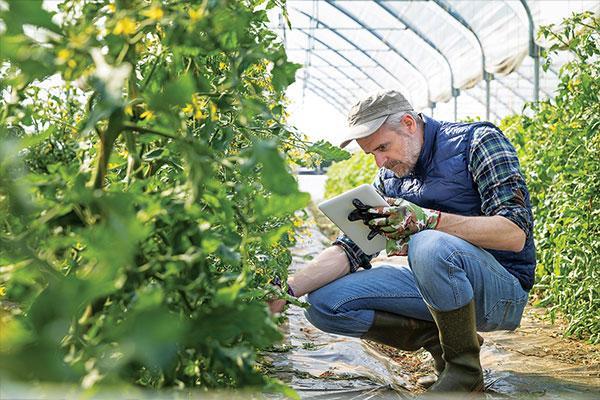Nutrients in EU agriculture
Nutrients such as nitrogen, potassium and phosphorous are essential for crops. Nutrients can be applied through commercially produced mineral fertilisers, as well as organic substances such as animal manure.
When used excessively, however, nutrients can be a major source of air, soil and water pollution with negative impacts on both biodiversity and the climate.
As part of the Farm to Fork strategy – one of the central pillars of the European Green Deal – the European Commission aims to see a reduction in nutrient losses from both organic and mineral fertilisers of at least 50% by 2030, while ensuring no deterioration in soil fertility. This is expected to lead to a reduction in fertiliser use of at least 20%.
The common agricultural policy (CAP) is the key tool in supporting the sustainable use of fertilisers in agriculture, ensuring that farmers can maintain productivity while also reducing harmful effects on the environment.
CAP actions
The CAP promotes sustainable agricultural systems in the EU, enabling farmers to:

provide safe, healthy, and sustainably produced food for society;

earn a stable and fair income;

protect natural resources, enhance biodiversity, and mitigate climate change.
Through a number of rules and measures, the CAP supports farmers in the sustainable use of nutrients.
The CAP 2023-27 entered into force on 1 January 2023. It puts agriculture closer in line with the targets of the Farm to Fork strategy with regard to reduced nutrient pollution.
CAP specific objectives
Sustainable nutrient management is relevant for a number of specific objectives for the CAP 2023-27, particularly those relating to climate change, natural resources and biodiversity.
CAP Strategic Plans
In their CAP Strategic Plans, EU countries have the flexibility to tailor strategies and interventions that can improve nutrient management at national level, in line with EU targets.
EU countries’ CAP Strategic Plans combine a wide range of targeted interventions to address their specific needs and deliver tangible results.
The plans must contribute to, and be consistent with, EU legislation and commitments relating to climate and environment.

Conditionality
Under conditionality rules, beneficiaries of the CAP have their payments linked with a set of statutory management requirements (SMRs) and good agricultural and environmental conditions (GAECs). Conditionality rules relating to nutrients include:
- the linking of payments with the Water Framework Directive (SMR 1) and Nitrates Directive (SMR 2);
- GAECs designed to protect water and soil, which involve the responsible use of nutrients.
Eco-schemes
Under current CAP rules, eco-schemes support farmers who adopt or maintain farming practices that contribute to EU environmental and climate goals. Through eco-schemes, the EU rewards farmers for preserving natural resources and providing public goods, which are benefits to the public that are not reflected in market prices and include practices that support sustainable nutrient management. Eco-schemes can for example:
- support soil management practices such as enhanced crop diversification with leguminous crops,
- reduce the use of inorganic fertilisers, catch crops, precision farming, and
- other practices which help to contribute to the objective of sustainable nutrient management.
Rural development interventions
The sustainable use of nutrients can be supported through rural development interventions. In their CAP Strategic Plans, EU countries can include a number of beneficial measures.
- Measures to support knowledge transfer and information, advisory services, and cooperation can be used to develop and disseminate knowledge on safe and efficient nutrient application.
- Measures to support organic farming encourage reductions in the use of inorganic fertilisers.
- Measures to ban the use of synthetic fertilisers, promotion of organic fertilisation, and best practices to limit nutrient losses to air and water.
Green architecture
The CAP 2023-27 includes strengthened rules and enhanced opportunities to support the efficient use of nutrients. For example, the enhanced conditionality of the CAP 2023-27 forms a stronger baseline of mandatory requirements related to the proper use of nutrients.
Additionally, a significant portion of the CAP 2023-27’s budget is devoted to eco-schemes, which can support voluntary practices by farmers – more ambitious than the legal baseline – that contribute to the sustainable use of nutrients.
At the same time, EU countries are obliged to reserve at least 35% of their Rural Development budget to environment and climate practices.

- General publications
- 26 June 2023
This document provides a detailed overview of the 27 EU members’ key elements and choices in their approved national plans. It also responds to requests for information to summarise what plans contain and aim to deliver.
Farm Sustainability Tool for nutrients
Within the framework of providing farm advisory services, EU countries will make a Farm Sustainability Tool for nutrients (FaST) available from 2024 at the latest.
The FaST will combine data and manual input from farmers to provide customised recommendations on crop fertilisation through a nutrient management plan. In addition, support for rural development will continue to fund land management payments, investments, knowledge-building, innovation and co-operation relevant to nutrient management.
Knowledge, research, and innovation
The Commission supports research and innovation in agriculture and forestry, with areas of focus including sustainable primary production and water, nutrients and waste.
The farm advisory system shares knowledge of new developments and advises farmers on best practices for the application of nutrients.
Legal basis
Conditionality is governed by:
- Rules on support for Strategic Plans drawn up by EU countries under the common agricultural policy (Regulation (EU) 2021/2115) (Delegated Regulation (EU) 2022/126);
- Rules on the financing, management and monitoring of the common agricultural policy (Regulation (EU) 2021/2116) (Implementing Regulation (EU) 2022/128).
Eco-schemes and Rural development interventions are governed by:
- Rules on support for Strategic Plans drawn up by EU countries under the common agricultural policy (Regulation (EU) 2021/2115).
Related links
Overview of aims, history and current rules of the common agricultural policy, supporting EU farmers and Europe’s food security.
The European Commission pushes for sustainability in agriculture, forestry and rural areas across the EU. The European Commission pushes for sustainability.


